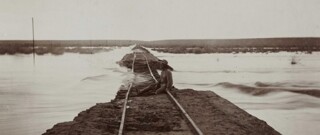In Berlin
Daniel Trilling
‘Colonialism as a form of violent foreign rule was legitimised by a racist ideology of European superiority,’ says the board that greets you at the Deutsches Historisches Museum in Berlin. In a slightly too small room, hundreds of objects are laid out in clusters along a line representing the Greenwich Meridian, a ‘symbol of Eurocentrism’ and the anchor for a system that European powers used to navigate, conquer and impose borders on large parts of the world. The objects – carved elephant tusks, commercial images for coffee brands, whips – tell the story of the German Empire.
For a visitor from the UK, it’s a surprise to see the subject dealt with in such stark fashion – hard to imagine an equivalent exhibtion at the British Museum. The opening of German Colonialism: Fragments Past and Present last year coincided with the official recognition the massacre of the Herero and Nama tribes, in what is now Namibia, as a genocide. At the museum, the genocide is retold in postcards sent home by soldiers stationed in south-west Africa. Photos of military equipment and prisoners are accompanied by breezy, banal messages to friends and loved ones.
At the Jewish Museum on 29 March, the British sociologist Gurminder K. Bhambra gave a lecture in which she pointed out that most of today’s refugees in Europe come from countries that were once colonies, whose poverty or instability are a result of that experience. She argued that the EU was a colonial project in origin: France’s African possessions were offered ‘as a dowry to Europe’ and non-white populations, such as Algerians under French rule, were deliberately excluded from the first agreements on free movement and welfare. The EU’s modern borders, she argued, are a way of preserving white privilege and wealth.
The Historical Museum tiptoes around such questions. There is a nod to ‘neo-colonialism’ and the persistence of global inequality, and the exhibition makes an effort to show how people interacted with and resisted domination, but it is limited by the nature of the material. Most of the objects were amassed or commissioned by those in power, and although the curators attempt to subvert the colonialist’s perspective – a collection of items belonging to the last governor of German East Africa lie scattered on the floor, overlooked by an imperious portrait of the governor – they don’t entirely escape it.
One exhibit stands out: a set of sound recordings made on shellac discs in 1917. During the war, British and French colonial troops taken prisoner on the Western Front were separated from the rest and sent to live in a camp outside Berlin. They were studied by scientists, some of whom got them to speak or sing. A Tunisian farmer sings a song he wrote about his conscription, war injury and imprisonment. A Gurkha recites the story of the prodigal son in English. A man from what is now South Sudan counts from one to twenty in his mother tongue, then departs from the script and demands to be released. The voices are upsetting, at once distant and shockingly immediate.
The recordings made me think about my work as a journalist, interviewing refugees who come to Europe from Africa and Asia, and about the way the colonial process of surveying, categorising, dividing up, selling, is reflected in the behaviour of today’s media. When we collect and tell stories about people, to what extent are we commodifying them? Does that process obscure the other reasons one might have for telling a story?
In April 2015, when two shipwrecks off the coast of Libya killed more than 900 people, a British newspaper asked me if I knew any refugees who had been on that route. My first thought was H., a Nigerian man I'd met at a protest camp in Kreuzberg with a group called Lampedusa in Berlin. They were black African men and women who had made their way to Europe across the Mediterranean and were demanding housing and the right to work. ‘We are here because of Berlin in 1885,’ one of their leaflets said. It described the Berlin Conference of 1884-85, which kickstarted the imperial ‘scramble for Africa’.
I wanted H. to tell his story because I knew he had this political context, and because I thought he could put up with the strain of reliving his journey. It worked, I think: we produced something clear and direct. Inevitably, it provoked a flurry of requests from other media organisations for further interviews. H. wanted to tell his story, but he also wanted to be left alone. Ignore your Facebook messages for a bit, I suggested. Don't worry, he said, I already am.

Comments
The whole cynical approach of these big players (governed by the governments - Asian Development Bank, World Bank, EBRD, EIB)is a reflection of the old and tried way of dealing with semi-literate 'savages' that the English perfected (handful of pearls for all this, how do you call it, right, Canada, well, put a cross on this line..). 'Savages' today are better informed but equally helpless.
If anyone is searching the roots of this on-going self-annihilation the focus should be on benefactors and promoters of 'international business' and particularly globalisation - already established as unquestionable canon of economics. The concept drains wealth to satiate the insatiable corporate greed, while leaving populations on both ends desperate, impoverished and antagonised.
Ever increasing masses of the western poor feel threatened by the desperate from South and East pressurising borders of their Lebensraum.
Ms Zille has explained herself more fully in the piece and you can decide whether her views fit your description of an attempt to justify the crime of colonialism. Sadly, there are many who have this view ('colonialism can't have been all bad'), and in my experience they're not all white South Africans.